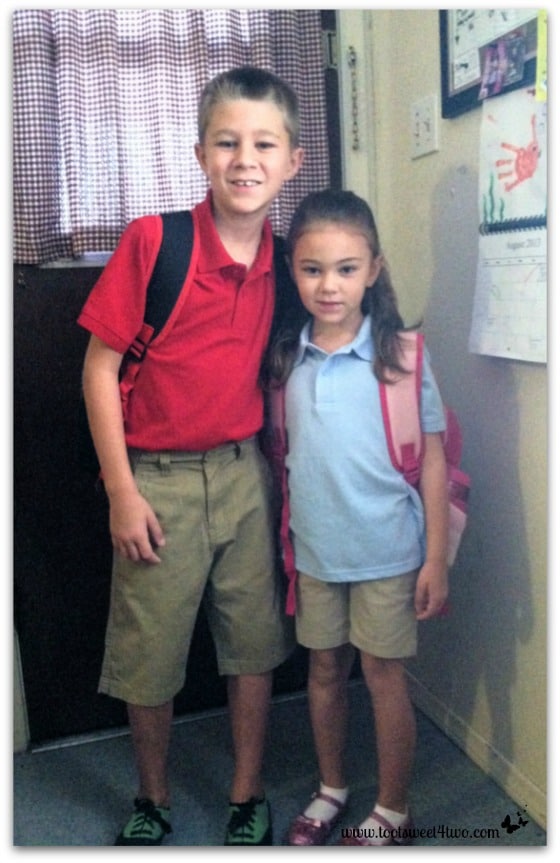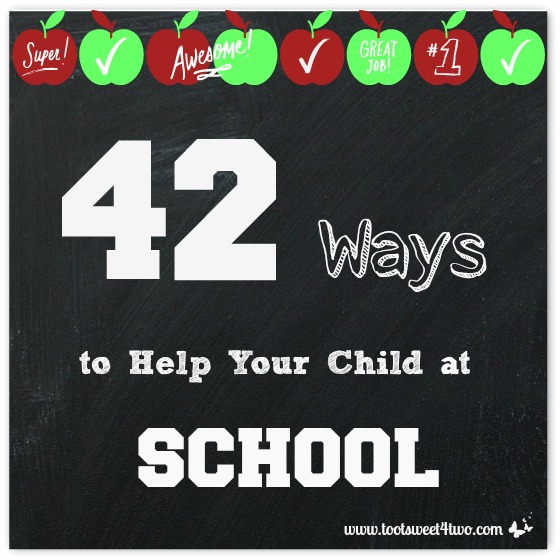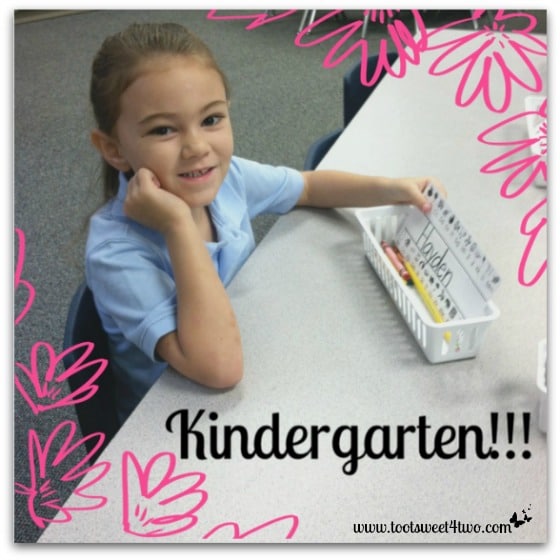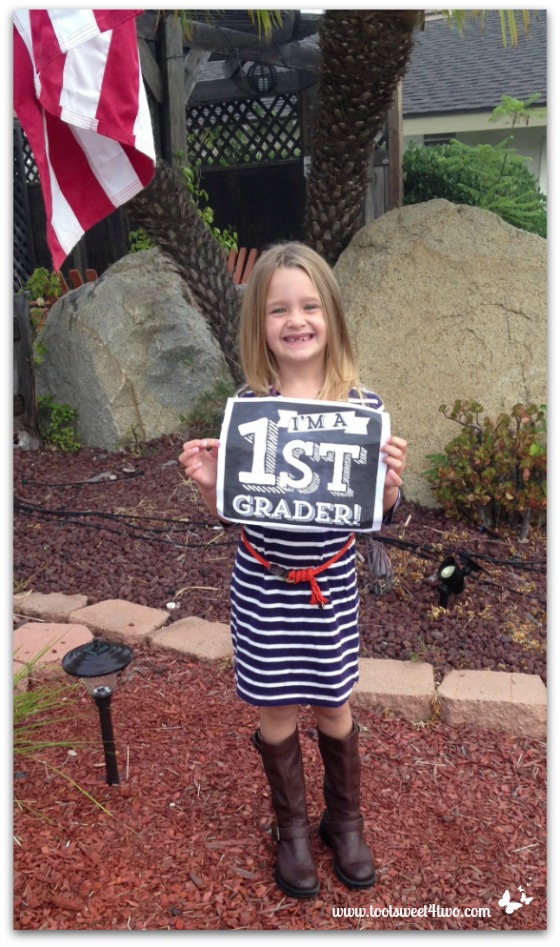My sister, Dawn, is an elementary school principal. In education for 32 years (as a teacher and now as a principal), she is well versed in early childhood education. Out of the blue, she sent me this list of 42 Ways to Help Your Child at School and told me I should post it on our blog! If you are a teacher, she has excellent advice for you, too: follow these four agreements!
That’s what I like:
- Active participation on our blog!
- Readers that want to contribute!
- Ideas that make a difference!
The fact that she’s my sister is just icing on the cake! So, thanks, Dawn for:
- being my sister
- taking the time to create and send this excellent, unsolicited list of 42
- for contributing to the “collective” ever-expanding lists of 42
- for being awesome!
With children heading back-to-school around the country, this list of 42 Ways to Help Your Child at School is a great review to see where you, as a parent, can improve to help your child succeed. I’ve created a FREE printable link at the end of this post. If you have a household binder to help you organize your life, this is a good one to print and add to your binder.

Prince Charming and Princess Sweet Heart on their first day of school (Dawn’s grandchildren and my great-nephew and great-niece).
Here’s the list:
- Make sure your child gets enough sleep at night (10 hours for Kindergarten to 2nd grade and 9 hours 3rd to 6th grade).
- Make sure your child eats protein in the morning before school.
- Check your child’s backpack (until 4th grade) for notes from school.
- No tardiness (as few as possible); the important subjects are taught early in the day.
- Help with homework, but don’t do it for your child.
- Check your child’s homework for completion and correctness.
- If your child hurried on homework and it is messy, make him/her do it over.
- If homework (for Kindergarten to 2nd grade) takes more than an hour each night, talk to the teacher.
- Read with your child regularly.
- Let your child read their basal (anthology) reader (or take home books) to you regularly.*
- Show your child how to look at the pictures for clues on words they are stuck on.
- Encourage your child to try to sound out the words.
- Let the teacher handle day-to-day issues; she will ask for help when needed.
- Attend Back-to-School Night.
- Ask questions at Back-to-School Night, if things are unclear.
- Make doctor and dentist appointments after school, if possible, or in the afternoon.
- Ask you child about their day.
- Find out what he/she plays at recess.
- Be concerned if he/she plays alone – try to find out why; alert the teacher, if needed.
- Give him/her ideas on how to ask someone to play at recess.
- Have a regular schedule for bedtime.
- Limit after school activities if your child is struggling in school.
- Take advantage of after school learning, if the teacher recommends it.
- Teach your child to use the computer.
- Monitor and limit use of computer and handheld games and other devices.
- Find a “program” that has practice on keyboarding (typing).
- Let your child play after school for at least 30 minutes before starting homework (on days with no sports practices).
- Give your child a healthy snack after school to hold them until dinner; sugary, starchy items will lead to whining before dinner (ugg!).
- If you work outside the home, take one sick day each year to go to your child’s school and check out his/her day. Go 30 minutes before lunch or recess so you can watch in class and on the playground. If you have concerns, talk to the teacher or principal.
- If you are a stay-at-home mom, volunteer a few hours each week to help at the school. Schools always need help. If you have a regular time, the teacher will have things ready for you to work on. If not, volunteer to let kids read to you, or ask if the office needs help.
- Take your children to the public library.
- Teach them to use the library; check books in and out, ask the librarian for help, etc. Do this while they are young and do it a few times each year (kids don’t learn things with one try). By doing this, they will know how to do it without you when they hit 6th grade on up and don’t want to be seen with you!
- Attend Parent-Teacher Conference time.
- Prepare for the conference by having questions ready ahead of time (there are lists on the internet).
- Try your best to follow any suggestions the teacher gives.
- If the teacher mentions possible retention (holding back a grade at the end of the year) and it is only November, ask for specific ways you can help your child catch up.
- If your child seems immature, consider retention if it is suggested. If you have concerns or questions, make an appointment with the principal (most have taught for many years and will be able to guide you forward).
- If retention is discussed, please keep in mind that it is always better to retain a struggling learner in Kindergarten or First Grade; it is less difficult emotionally on the child and the “Foundations for Reading and Math” are taught in these grades. A retention at 4th, 5th, etc. affects a child’s friendships and lowers self-esteem.
- Arrange play dates with your child’s friends. Start by meeting at a park. Don’t send your child to a home where you are not comfortable with the adults or older siblings.
- Don’t put extra-curricular activities (sports, karate, music, dance) ahead of school; that’s why they are called “extra”.
- Allow your child to make small mistakes that will teach him/her life lessons.
- ALWAYS be your child’s advocate; but, let him/her learn from his/her mistakes.
*Basal (anthology) reader is the reading textbook used to instruct in reading. It has grade level stories that increase in difficulty as the year goes on, building vocabulary and using specific phonics and grammar skills.
Many thanks to Dawn for sharing this awesome list! Here’s the FREE printable list for your household binder: TS4T List – 42 Ways to Help Your Child at School.
Hope back-to-school is an exciting time for your children! It always was for me!
Tootles,
Related Posts:
(other posts about back-to-school)




You have written an awesome site.
You are so kind to say that! Thank you!